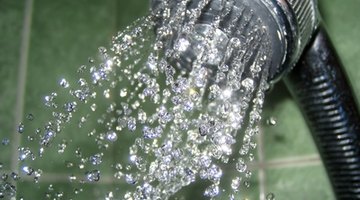How do I Work With Hardboard in Shower Stalls?
Hardboard is a good material to use in shower stall walls because it's water resistant and easy to clean, and the panels allow for quick installation. Also referred to as high-density fiberboard, hardboard is made from highly compressed wood fiber and has a waterproof synthetic coating on one side. There are several different brands with various colors and patterns. Tileboard, with a tile pattern, is a type of hardboard.

-
Measure very carefully. Mark and cut the hardboard into the right-sized panels face up if you're using a table saw or hand saw, and face down if you're using a portable circular saw. For ceilings lower than 8 feet cut the board to allow a 1/4-inch gap on the top and bottom. This allows for expansion. Prior to installation, line the boards up, mark them where they will join and cut where necessary to fit. Also, cut as needed for the hardboard to go around fixtures.
-
Install hardboard and tileboard over a solid backing such as plywood. Install cement board that has been fixed over a moisture barrier such as Tyvek or asphalt felt paper. Clean the backing and sand with coarse sandpaper if the board is too smooth. Remove any dust from the back of the hardboard. Apply adhesive in a zigzag pattern to the backing and spread it with a notched trowel. Push the board onto it, taking care that the edge of the panel lines up with the studs starting at an inside corner. Leave a 1/4-inch gap between panels. You might need to hammer a few nails around the edges to hold the board in place. Use a rubber mallet or padded wood block hammer. After 15 minutes, press the board onto the backing again.
-
Use matching colored 1-inch ringshank nails every 6 inches along the edges, and 8 inches apart onto the studs through the panel grooves, which are located every 16 inches, to meet standard stud distance specifications. Do not nail Tileboard.
-
Wait until the adhesive has set, then apply matching silicone caulk in all the gaps and around the shower base.
References
Writer Bio
Trish Jackson is an author, blogger and freelance writer. Her second romantic suspense novel, "Redneck P.I.," was released in March 2011. Jackson particularly likes to write articles relating to life in the country, animals and home projects and has kept a blog focusing on this since 2006.
Photo Credits
- shower image by Ekaterina Shvigert from Fotolia.com
More Articles



